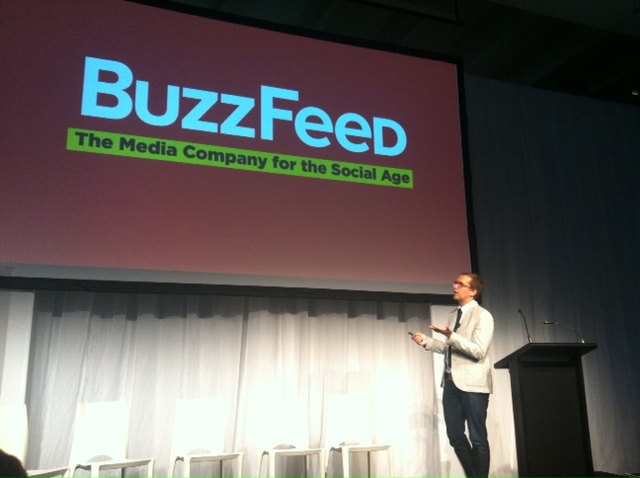Last week, the viral news site Buzzfeed launched its Australian operation with a visit from Scott Lamb, the company’s Vice President for International operations.
As the “media company for the social age” in Scott’s words, Buzzfeed has led the way in ‘viral media’.
The viral media model revolves around audience reach, and revenue, being measured on the amount of sharing on social media services like Facebook and Twitter rather than how many people view or visit their websites.
Buzzfeed’s Cat problem
For Buzzfeed attracting this traffic mean cats – people love sharing pictures of cats on the web.
While Scott likes cats as much as any of his readers, he describes the industry as facing a ‘cat problem’.
“The cat problem is that we all love cats, but they’re also a barrier to taking the internet seriously,” Scott said. “It’s true for Buzzfeed and it’s true for a lot of other websites as well.”
Cats may be both a problem and a boon for Buzzfeed but there’s more to the business with Scott describing to the Sydney audience what he saw as the four myths of online media;
- Long form writing doesn’t work on the web
- Paying attention to clicks leads to lowest common denominator stories
- Social is merely a box you need to check
- Creating sharing content is easy and trivial
There’s no doubt that item four is hard, although how much harder re-purposing stuff found on the web is compared to creating original content is open to question.
Point three is a given for Buzzfeed given its business model and there would be few media sites that weren’t concerned about how often their stories aren’t shared on social media.
Being taken seriously though weighs heavily on Buzzfeed so it was the two first points that Scott emphasised in his Sydney presentation.
Long form journalism
Scott was proud to show off BuzzRead stories like Why I Bought A House In Detroit For $500 or The Most Dangerous Sentence in US History to show the site’s credibility as a reputable, considered venue for long form journalism, just like the New York Times.
The problem for Buzzfeed’s aspirations though is the US Presidential story received 1,400 tweets and just over four thousand Facebook shares, the Detroit story gained five thousand tweets and 29,000 shares.
On the other hand, a quiz on what city should you live in received 578,000 shares and 26,000 tweets. For the record, I got London which is something I’m ambivalent about but certainly beats getting Murmansk.
That meme proved so good that Buzz Feed repeated it a week later with a what sort of job you should have quiz.
You can’t blame them for exploiting a meme, particularly one that gets half a million shares.
Scott though didn’t see the traffic mismatch between the worthy and the tabloid as being a problem; “we know we can’t equate an 8,000 world article to a quiz,” Scott said. “In terms of our business model our revenue isn’t tied to page views.”
“There is incentive for us to get as many a views for an 8,000 word article as possible.”
Riding the Facebook tiger
Regardless of the viability of 8,000 words articles, the real problem for Buzzfeed in its aspirations to become a virally shared New York Times is the site’s reliance on Facebook.
Relying on Facebook is path to disappointment, the service has shown it’s quite willing to burn partners, including advertisers, small businesses and users in the interests of its own corporate interests.
For Buzzfeed, the assumption the media site’s corporate interests will always align with Facebook’s is brave assumption.
Another problem for Buzzfeed is content, the bulk of the site’s material and what drives most sharing are posts that gather pictures from the web – primarily Facebook.
Using other people’s content lies at the core of viral sharing sites and most of Buzzfeed’s competitors shamelessly steal material from other websites, particularly Buzzfeed, in the aim to drive shares from gullible users.
Buzzfeed itself isn’t immune from that risk, with a photographer suing the site for $3.6 million over a photograph used in one of its lists.
Risks in the model
On the scale of risks to Buzzfeed not being seen as an viral version of the New York Times is quite low; the real risks are of being overtaken by a savvier competitor, falling victim to a Facebook change of policy, or simply turning out to be a transition effect in an industry that’s undergoing massive and rapid change.
The aspiration of Buzzfeed becoming a New York Times is probably irrelevant anyway, most Facebook users don’t care about long form journalism – they like cats.
In an era where the public wants animal pictures and celebrity scandals – who needs to be the New York Times?
Perhaps the cat problem isn’t a problem, but the future for media channels like Buzzfeed.
Similar posts:




